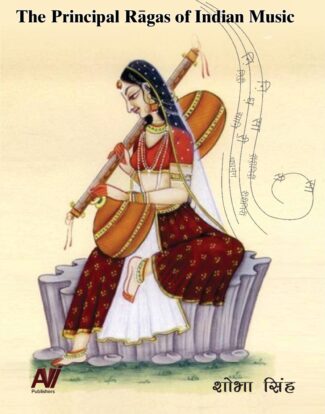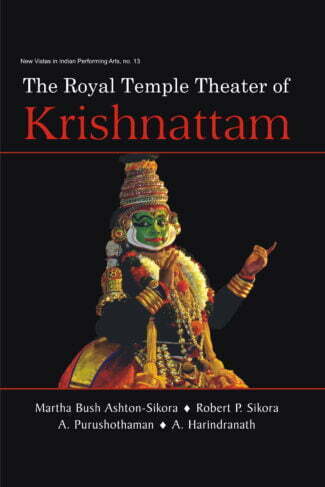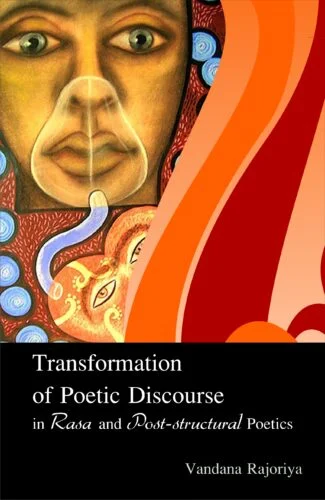Showing 73–78 of 78 results

‘Thaat’ is the method of dividing ragas in Hindustani classical music. The main raga of each ‘Thaat’ is called the ‘Ashraya’ raga and other ragas are ‘Ashrita’ ragas. This book is an attempt to make the readers aware of the ‘Ashraya’ ragas. The author has very clearly presented the concept of Ashraya’ raga and its significance.
Music has been the subject of study in India since Vedic period. Various ragas are the life of Indian music. ‘Thaat’ is the method of dividing ragas in Hindustani classical music. The main raga of each ‘Thaat’ is called the ‘Ashraya’ raga and other ragas are ‘Ashrita’ ragas. Extracting from the texts written by Pt. Vishnu Narayana Bhatkhande, Pt. Narayana Moreshwar Khare and other well-known musicians, this book is an attempt to make the readers aware of the ‘Ashraya’ ragas. Through this book, Shobha Singh has very clearly presented the concept of Ashraya’ raga and its significance. The language of this book is simple and easy to comprehend. भारत में संगीत वैदिक काल से ही अध्ययन का विषय रहा है। विभिन्न राग भारतीय संगीत की जान हैं। थाट (अथवा ठाट) हिंदुस्तानी शास्त्रीय संगीत में रागों के विभाजन की पद्धति है। प्रत्येक थाट के प्रमुख राग को आश्रय राग एवं अन्य रागों को आश्रित राग कहा जाता है। पं. विष्णु नारायण भातखण्डे, पं. नारायण मोरेश्वर खरे एवं अन्य जाने-माने संगीतज्ञों द्वारा लिखित ग्रंथों को निचोड़ते हुए, यह पुस्तक पाठकों को आश्रय रागों के बारे में अवगत कराने का प्रयास है। इस पुस्तक के माध्यम से शोभा सिंह ने आश्रय राग की अवधारणा और उसे महत्व को बहुत ही स्पष्ट रूप से प्रस्तुत किया है। इस पुस्तक की भाषा सरल एवं पठनीय है।

Krishnattam, a unique Sanskrit ritualistic dance-theater of Kerala, is one among India’s treasure trove of rare living artistic masterpieces. This history-travelogue, richly illustrated, takes one along to experience the Krishnattam plays, with their rituals and preparations, as the performers in fantastic, colorful costumes, dance, and mime the story of Lord Krishna’s life to the accompaniment of vocal and instrumental music.
Krishnattam, a unique Sanskrit ritualistic dance-theater of Kerala, is one among Indias treasure trove of rare living artistic masterpieces. In time past, Krishnattam, based on the Sanskrit poem Krishnagiti by the Zamorin King Manaveda, thrived in the royal environment of the Kingdom of Calicut, receiving the adoration of small devoted audiences. But, with Indias independence, the Zamorin lost his kingdom, and as his wealth dissipated, Krishnattam teetered on the edge of extinction. It was the Krishna-Vishnu Temple at Guruvayur that came to Krishnattam’s rescue and has become an integral part of the history of Krishnattam. Here, again, Krishnattam remained in seclusion until 1961, when the troupe performed in Bombay, exposing it to a larger Indian audience and foreign interest.
This history-travelogue takes one along in the dark of night to experience the Krishnattam plays, with their rituals and preparations, as the performers in fantastic, colorful costumes, dance, and mime the story of Lord Krishna’s life to the accompaniment of vocal and instrumental music.
This volume, richly illustrated, makes one meet some people, who have been the soul of Krishnattam. The actor-dancers share the quirks of fate, the severity of training schedule, and the rigor of exercises that transformed them from village children into performers. Currently, Krishnattam thrives at Guruvayur Temple, together with ample outside performances, as a devotional votive offering.
The first author takes one along on her twenty-year journey to discover the history and attractions of this art so rarely performed outside its locale in south India. Co-authors, Robert Sikora, A. Purushothaman and A. Harindranath greatly enhance this edition with their new researches, translations, and photographs.

This work is a dedicated effort at defining rasa and post-structuralist theories in clear and graphical terms while focusing on intercultural application of these theories by applying rasa to canonical English poems and post-structuralism Western theories to classical Sanskrit works.
Rasa, the Indian literary theory, and the post-structuralism, the Western literary theory, constitute two important areas of study in literary criticism and literature. This volume tries to define rasa and post-structuralist theories in clear and graphical terms. It focuses on inter-cultural application of these two classical theories. This involves the attempt to apply the Indian literary theory of rasa to canonical English poems including those of the epic stature like Dantes Divine Comedy and John Miltons Paradise Lost. It also applies the Western literary theory of post-structuralism, those of Derrida, Lacan and Foucault, to canonical works of Sanskrit poetry like Bhartrharis Shringarashataka, Shudrakas Mrcchakatika, Dandins Dashakumaracarita and Mudrarakshasa of Vishakhadatta among others.
The comparative study that involves a deep and engrossing study of various situations in the epics and other works, unfolds the uniqueness of the latter. It reveals the similarities in the two theories such as their goal of generation of value, quite realistically. It discusses the distinction in the rasa and post-structuralist formations, such as the idea of communication being one of the important principles of the conceptualisation of form and structure of rasa, while the art of communication is not so evolved in post-structuralism.
The structure of the study is planned in a sequential order to enable readers to easily understand the theories and their application. The book is bound to be useful to scholars and students of Indology, particularly Indian literature and literary criticism, and those interested in cross-cultural studies in this field.

A comprehensive and intelligent piece of literature, for all that you yenned to know about the King of Indian slide Guitar, creator of Mohan Veena and Vishwa Veena, Grammy Award winner and a true human being in absolute terms, Pandit Vishwa Mohan Bhatt, complete with his inspirations, aspirations, musings and goals.
Saga of a living phenomenons journey on mesmerisingly melodious musical notes. His fascinating imagination, strengthened by divine interaction, culminated in the innovation of the Mohan Veena and the Vishwa Veena. Embodiment of avant garde thought process, the legend crafted the instruments to express the subtle nuances and intricacies of Indian Classical raags, with perfection. His relentless efforts and soul stirring concerts seasoned by a fine balancing act between Indian Classical and other Global-regional musical styles, catapulted Indian Classical music, to a global stage. A chronicle of all those fusion concerts with compatriot musicians and several globally renowned virtuosos which surrepetitiously slip one into a state of trance, with their resonating acoustics. Recollections of that glorious yet humble soul who helped realize the Great Indian Musical Dream. Reflections on the performances and discography; aspirations and inspirations; musings and goals of a paradigm of musical genius. Here is a comprehensive piece of writing, for all that you yearned to know about the King of Indian slide Guitar, the creator of Mohan Veena and Vishwa Veena, a Grammy Award winner and a true human being in absolute terms Pandit Vishwa Mohan Bhatt.

Vyangyavyakhya (interpretation of implied sense), ninth century, is the first performance text in Sanskrit applying dhvani to Bharata’s theatre. The author Kulasekhara deserves a place next to Anandavardhana and Abhinavagupta in the history of Natyasastra studies. The text is published for the first time.
The doctrine of dhvani, expounded by Anandavardhana (ninth century ce) in Kashmir though contested by his contemporaries at home, received sound acclamation in Kerala. A royal dramatist Kulashekhara of the same century applied dhvani to the theatre. His performance text is known as Vyangyavyakhya (VV), meaning interpreting the implied. This was an epoch-making event in the history of Indian theatre. This innovation in performative practices marked a deviation from Bharatas national tradition and laid down the foundation for classical forms like Kutiyattam, Kgrshnanattam, Kathakali and Mohiniyattam. VV today continues to inspire contemporary directors to formulate new interpretative sub-texts for ancient plays. VV, which remained in manuscripts till now, is published for the first time.
As icing on the cake, four eminent scholars K.D. Tripathy, Radhavallabh Tripathi, N.P. Unni and Kavalam Narayana Panikkar delve deep into the aspects of VV as introduction to this book. This volume discusses in detail the Sanskrit theatre until tenth century ce, performance texts of Dhananjayadhvani and Samvaranadhvani, and the developments in the post-Kulashekhara era.
VV should serve as a guide to all practitioners of performing arts, and should entice students, teachers and lovers of Indian performing arts.

This collection of essays is a pioneering attempt to look at Hindustani rhythm from the viewpoint of the contemporary Western aesthetics, as also to weigh this aesthetics against the theory and practice of rhythm as it permeates and determines the music and Kathak dance of north India. (46 words)
This collection of essays, a thoroughly revised and enlarged version of its first earlier edition (1979), is a pioneering treatment of the Hindustani rhythm in the way of contemporary (Western) aesthetics. It seeks, on the one hand, to determine and distinguish the meaning of such key words as laya, matra, bol, theka, sama, and layakari, and, on the other hand, to seize the details and aesthetic semblances of live rhythm as they appear to contemplation.
Some wider aesthetical questions have also been addressed in this book. How, if at all, can rhythm be regarded as an autonomous art? What are the elements of its winged form, and how can it yet appear steadfast and virtually motionless? Is it proper to speak of the art of rhythm as symbolic in its significance or as expressive in some distinctive way? Or, can it be said to embody what it signifies?
Insofar as rhythm is fast becoming a vital subject of aesthetic reflection in the West today, the book also seeks to weigh the conflicting views of two modern aestheticians, Susanne K. Langer and Philip Alperson, against the theory and practice of Hindustani rhythm.
Every lover of this specific genre of rhythm stands to benefit from a reading of this book. It would prove to be of value also to those who are interested in Kathak dance, for no other classical dance of India depends so manifestly on rhythm.